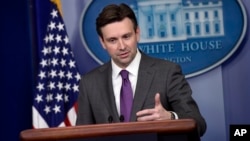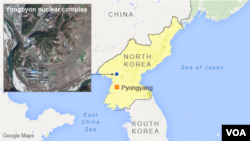The United States is warning North Korea against engaging in "irresponsible provocations" after Pyongyang announced it had restarted "normal operations" at its Yongbyon nuclear complex.
White House spokesman Josh Earnest said Tuesday that North Korea "should refrain" from actions "that serve only to aggravate regional tensions and should focus instead on fulfilling its international obligations and commitments."
The White House issued the statement after North Korea warned it is ready to use nuclear weapons against the United States at "any time."
The comments published in the Korean Central News Agency (KCNA) came as Pyongyang also threatened to use banned ballistic missile technology to launch a weather satellite into orbit.
Earnest said the position of the United States and the world remains unchanged, that North Korea will not be accepted as a nuclear state.
The threats constituted a return to the belligerent rhetoric often employed by North Korea in an effort to obtain political concessions from South Korea and the United States, two of its main foes.
"All the nuclear facilities in Yongbyon including the uranium enrichment plant and Five megawatt reactor were rearranged, changed or readjusted and they started normal operations," KCNA reported.
Yongbyon is the center that produced the material used in North Korea's three nuclear tests. The complex was shut down in 2007 as part of a deal with the United States, but parts of it were later restarted.
The United States and its allies are seen as the main targets for the North's nuclear and ballistic missile programs.
South Korea on Tuesday warned the North against conducting the long-range rocket launch, a day after Pyongyang hinted it may do so during a key political anniversary next month.
Such an act would be a "serious provocation" and a violation of U.N. resolutions banning the North from conducting ballistic missile tests, according to South Korean presidential spokesman Kim Min-seok.
But Kim said Seoul has not seen any signs that Pyongyang is preparing for a launch.
North Korean officials on Monday vowed to move ahead with plans to launch what they say is a weather satellite into orbit. They gave no timeframe for such a launch, but there has been speculation it could carried out October 10, the 70th anniversary of the North's ruling Worker's Party.
"The world will clearly see a series of satellites ... soaring into the sky at the times and locations determined by the WPK central committee," said the Korean Central News Agency, quoting the director of the national aerospace agency.
While North Korea insists the launch has peaceful purposes, the United States and its ally, South Korea, along with many other nations view such moves as disguised tests of the same technology used in ballistic missiles.
Japan, a key ally of the U.S. and a main foe of North Korea, also warned Pyongyang against a launch.
"Even if the missiles are for satellite purposes, firing long-distance missiles is an outright infringement of the U.N. Security Council resolution," said government spokesman Yoshihide Suga.
After repeated failed attempts, the North successfully placed a weather satellite into orbit in late 2012, a major technological achievement that brought another punishing round of international sanctions against the isolated, communist state.
The North responded to the sanctions by conducting its third nuclear test in February 2013. The previous tests were in 2006 and 2009.
Any fresh rocket launch or nuclear test risks disrupting a period of warming relations between the two Koreas. The two sides in August exchanged artillery fire near their border, but later signed a landmark agreement to improve ties.
Under the deal, the two Koreas next month plan to resume a program of meetings meant to reconnect families separated for decades by their 1950s conflict. Leaders from both countries also plan to hold a series of meetings to discuss improving relations.
Relations between Seoul and Pyongyang are notoriously rocky. The two sides remain in a technical state of war since the Korean War ended in a truce instead of a formal peace treaty.











